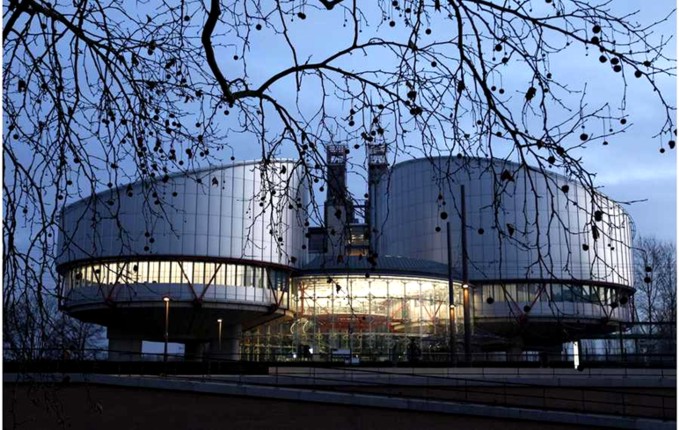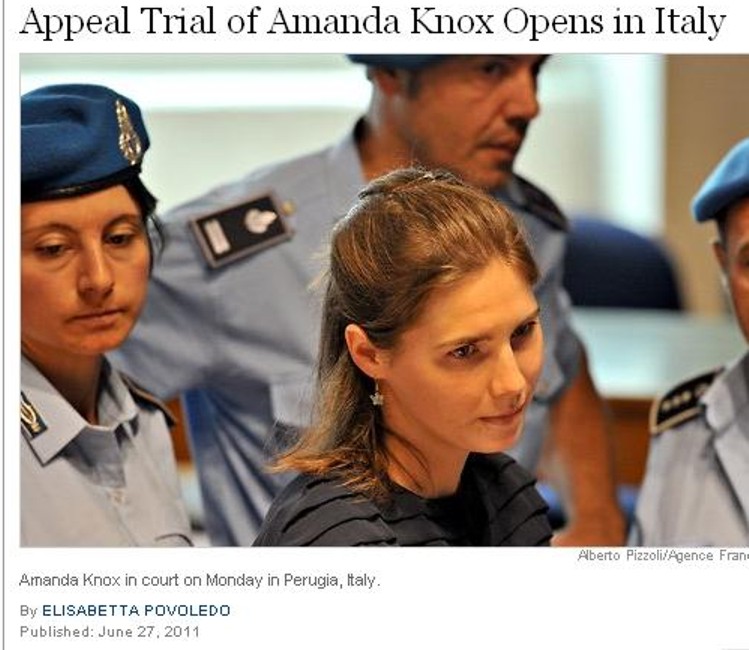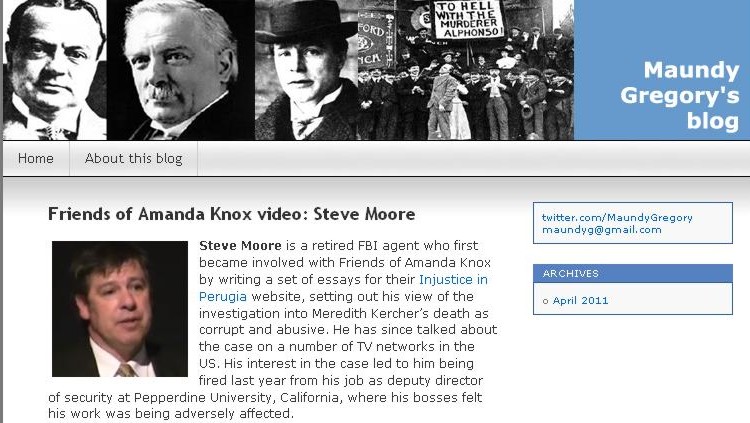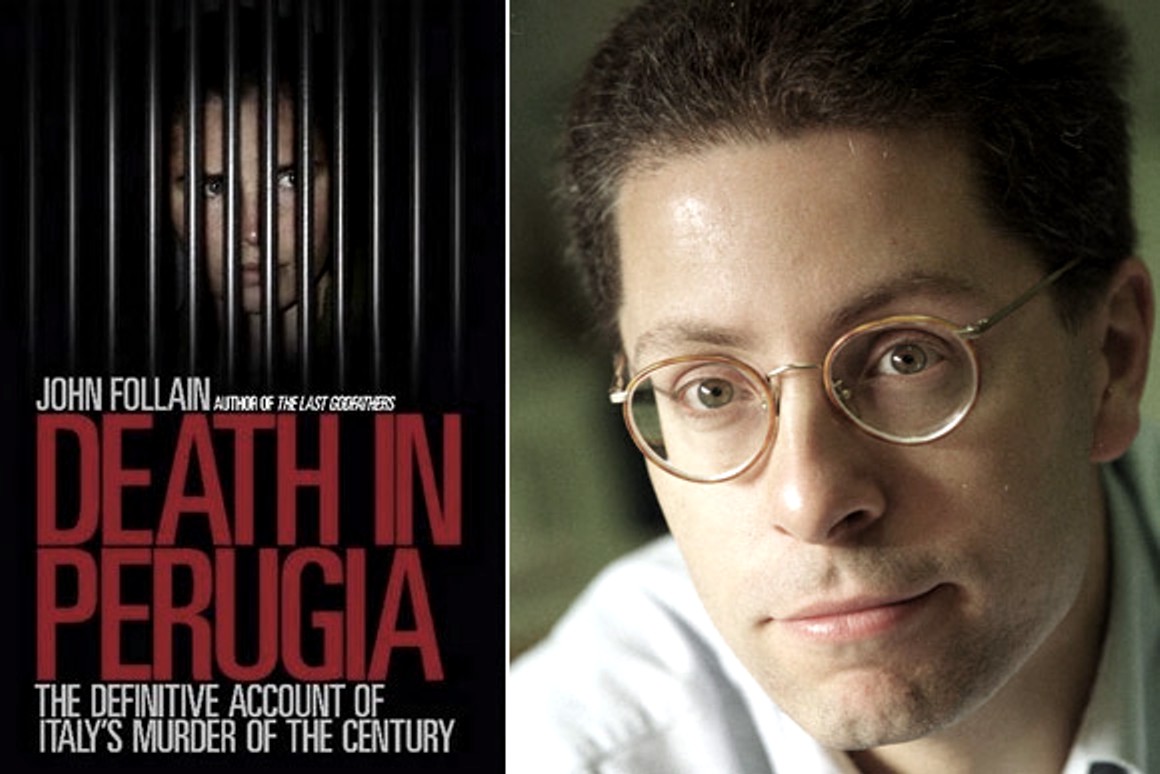
Category: Media developments
Wednesday, September 14, 2011
A New Book Explains The Unfruitful Emergence Of More And More Conspiracy Theories
Posted by Peter Quennell
Conspiracy theorists have dismally failed to come up with a plausible alternative theory of how Meredith died.
However, they do keep trying. So do the proponents of literally hundreds of other conspiracy theories, constituting vast amounts of effort probably better spent elsewhere - conspiracy theorists very rarely achieve very much, or do well economically, or rise to the top jobs.
The articles here and here look with skepticism on the 9/11 conspiracy theories which on the tenth anniversary of the twin towers coming down have been pushed hard by the various factions.
Now a new book “The Believing Brain” explains the mental makeup that disposes people to so eagerly believe the worst of our fellow man or our governments: One review in the Wall Street Journal..
In Mr. Shermer’s view, the brain is a belief engine, predisposed to see patterns where none exist and to attribute them to knowing agents rather than to chance””the better to make sense of the world. Then, having formed a belief, each of us tends to seek out evidence that confirms it, thus reinforcing the belief.
This is why, on the foundation of some tiny flaw in the evidence””the supposed lack of roof holes to admit poison-gas cans in one of the Auschwitz-Birkenau gas chambers for Holocaust deniers, the expectant faces on the grassy knoll for JFK plotters, the melting point of steel for 9/11 truthers””we go on to build a great edifice of mistaken conviction….
Mr. Shermer offers a handy guide for those who are confused. Conspiracy theories are usually bunk when they are too complex, require too many people to be involved, ratchet up from small events to grand effects, assign portentous meanings to innocuous events, express strong suspicion of either governments or companies, attribute too much power to individuals or generate no further evidence as time goes by.
The increasingly shrill posts appearing daily on the website Ground Report seem to mark pretty high against that list. Could the Evil Mignini have engineered even this?
Oops. Another conspiracy theory in play.
Saturday, September 10, 2011
Conspicuous By Their Absence Now: Legal Commentators For Sollecito And Knox
Posted by Peter Quennell
There is a marked sharp contrast now between how various reporters without legal backgrounds and various real lawyers are seeing the state of play in the appeal.
The post below shows how flavor-of-the-month reporters like Nick Pisa are still reporting happy talk from Knox and her entourage, while, within their professional constraints, we see more and more lawyers realisng Sollecito and Knox really are cooked.
Half a dozen of the main posters on TJMK who are lawyers (they identify themselves as such when they post) have explained how tough is the real case. Various Italian lawyers continue to offer us insights and tips from Perugia and Rome. And we continue to see maybe half a dozen lawyers a week getting in touch by email or signing up, a trend that shows no sign of fading out.
In contrast all of the lawyers and legal commentators who were once suggesting the process in Perugia had taken a wrong turn have gone quiet, and no new legal voices for Solllecito and Knox are speaking up. The CNN legal shows devote almost no air time to the appeal, and Geraldo Rivera, Dan Abrams, John Q Kelly, Lis Wiehl and others have wound down their commentaries to brief equivocations or nothing at all.
Ted Simon who is believed to be still on the Mellas-Knox payroll seems be operating only from very deep cover. Knox’s own lawyers pass on the (to us sad) happy talk from Capanne while themselves sounding very cautious and down.
And the former lawyer and political commentator Ann Coulter who does us the peculiar favor of including us in her definition of right wing is starkly declaring that the increasingly small number of increasingly shrill non-lawyers for Sollecito and Knox really should get a life.
By now, the only people who believe Knox and Sollecito are the usual criminal apologists and their friends in the American media.
Serial smearer and evidence incompetent Steve Moore as one of the usual criminal apologists?! That has to hurt.
Monday, July 18, 2011
Respected Journalist Carl Bernstein Criticizes “Murdochism” For Debasing News Reporting
Posted by Peter Quennell
Carl Bernstein was one of the two intrepid Washington Post reporters who helped to bring down President Nixon over the illegalities of Watergate.
He is being seen daily on American TV now and (as above) on British TV decrying the reporting methods and culture which are now being exposed in London, and the manufacture of false news and sensationalism which have left audiences falsely angered and concentrating on all the wrong things.
And which are now resulting in a large popular backlash, and the fleeing of advertisers from the Murdoch newspapers.
On the whole, the UK Murdoch media vehicles reported fairly on Meredith’s case (Sky News, London Times, London Sunday Times, The Sun) but the New York Post stirred things up (see here and here) as did especially Geraldo Rivera on his talk show on Fox TV News.
And the aggressive sensationalist culture did spread far and wide. The much milder competitor to the New York Post, the New York Daily News, has this to say::
The question now is whether the scandal will bring down the most successful propaganda fount in the world, Fox News, or if it will simply continue to sell factoids as “fair and balanced” fact.
This is much more serious than merely hurling mud at a target who has long helped Republicans by slinging loads of mud. The basic problem is, as Carl Bernstein points out in Newsweek, Murdoch became terribly influential with a simple way of doing things:
Just reduce every issue to a child’s level of perception with sensational headlines leading only to black and white, bad and good. In the practices of his mammoth News Corp., Murdoch always sent ethics and fact flying out the window in favor of profits. .
The New York Times has posted a good history of how and why Rupert Murdoch evolved his media culture in Troubles That Money Can’t Dispel here.
As of today, it looks like Rupert Murdoch and possibly his two sons and daughter may all have to stand down in face of anger from News Corps’ nine independent directors on its board of sixteen. News Corps stock value has been hemorrhaging half a billion a day for two weeks.
The directors may also pull the plug on more newspapers and maybe make News Corp exclusively an entertainment company - and get out of faux news.
Monday, June 27, 2011
Today’s New York Times Headline: Why Most US Main Media Should Be Disbelieved And Ignored
Posted by Peter Quennell
But (1) this is an appeal, not a trial, and (2) the first session was back in November 2010. It stands uncorrected still. But (as Fly By Night observes in a comment) this weird correction appears down below.
Tuesday, May 31, 2011
In Europe Human Rights Especially Privacy Trumping Web Defamers And Damaging Journalism
Posted by Peter Quennell

The legal lie of the land seems to be increasingly in favor of those in Italy and the UK and even the US being serially defamed by “Bruce Fisher” and others on the cynical pro-Knox bandwagon.
The European Community’s Parliament and the European Court of Human Rights (image above) are both situated in Strasbourg in north-east France. The ECHR was established in 1998 by the Council of Europe, not the EC, and it has 47 member governments including Russia.
It receives its basic guidance from the European Convention on Human Rights. Article 10 on freedom of expression and human rights reads as follows:
1. Everyone has the right to freedom of expression. This right shall include freedom to hold opinions and to receive and impart information and ideas without interference by public authority and regardless of frontiers. This article shall not prevent States from requiring the licensing of broadcasting, television or cinema enterprises.
2. The exercise of these freedoms, since it carries with it duties and responsibilities, may be subject to such formalities, conditions, restrictions or penalties as are prescribed by law and are necessary in a democratic society, in the interests of national security, territorial integrity or public safety, for the prevention of disorder or crime, for the protection of health or morals, for the protection of the reputation or rights of others, for preventing the disclosure of information received in confidence, or for maintaining the authority and impartiality of the judiciary.
Note the real strength of that second paragraph. While free speech is generally favored, it will not be protected if it is unfairly damaging to individuals or anarchic to the functions of courts and the governments.
With the pervasive spread of the internet, and the huge potential now for damage to be done globally, the ECHR generally mirrors national courts ruling in favor of those individuals who had been defamed and damaged by unfounded claims by journalists and internet posters.
Many member governments now have firmer human rights legislation either in place or in the pipeline, and the right to personal privacy and protection on matters that do not affect the public good is invariably a strong part of that new legislation.
Here is Julius Melnitzer of Canada’s National Post explaining, in the context of one case in which the ECHR did rule against a national court, that this is not the main trend being observed (emphasis added).
The European Court of Human Rights ruled on Tuesday that British reporters and journalists need not contact the subjects of potentially defamatory stories before publication to protect people’s privacy.
But the decision isn’t likely to quell the potential for litigation against individuals and businesses arising from online publication of statements that negatively impact reputations.
That’s partly because the law of defamation and the law of privacy are quietly blending, all to the advantage of victims, particularly celebrities, who have been defamed or have had their privacy invaded….
“There’s clearly an increasing overlap between the law of defamation and the law of privacy,” says Michael Smith, who practices defamation law at the Toronto office of Borden Ladner Gervais LLP. “Individual social media users should be concerned, but employers face even greater risk because each time an employee posts a negative comment online while at work, or from a work asset such as a laptop or smartphone, the employer is exposed to liability.”...
It’s not just negative comments, but unduly intrusive ones, that can attract liability. While the mere fact that something is true and not malicious may prove a defence to defamation, victims can base their case on an invasion of privacy so long as there is no public interest in reporting the subject matter of their claim.
It’s not that Canada has seen a host of such social media-related suits. “But Canadians spend more time online than any other nationality, which means it’s only a matter of time before we start seeing these types of cases,” Mr. Smith says. “People are thinking less about they’re writing, and they’re firing off knee-jerk reaction missives without a sober second thought.”
As well, high-profile cases like the one involving Mr. Mosley and the extensive publicity afforded rocker Courtney Love’s recent payment of US$430,000 to settle a suit over defamatory remarks she made on Twitter means that awareness of victims’ rights will grow.
“And that’s when we’re likely to see an influx of defamation cases related to social media,” Mr. Smith says. Many, of course, will be small cases, of the mom and pop variety. But the upside on liability is huge.
“As the courts have noted, defamation or breach of privacy on the Internet can amount to permanent, worldwide damage to reputation,” Mr. Smith says.
Smart move of Knox’s and Sollecito’s parents to be far more restrained now in their public comments these days, especially as all of them will face their own day in court. Perhaps those driving the Knox bandwagon should do likewise.
Maybe first stop inventing approximately 100% of their “facts” and scrub their internet postings clean.
Monday, April 18, 2011
Three Excellent Websites Commenting On The Case That We Have No Connection With
Posted by Peter Quennell
TJMK has cross-posting relations with Miss Represented, and Peter Hyatt, and several other objective websites on Meredith’s case.
These below are three careful, objective websites we’ve had no connection with, but admire. Click on the images to get to them.
____________________________________________________________________________________________
____________________________________________________________________________________________
Tuesday, April 05, 2011
The Precise And Accurate Italian Wikipedia Article On Meredith’s Case, Now Translated Into English
Posted by Tom M and Skeptical Bystander
A recent post on TJMK by Gwaendar refers to Wikipedia and the current effort by the Fictitious Friends of Amanda to make her the focus of an article that has so far been devoted to the Murder of Meredith Kercher.
The Eclectic Chapbook blog often comments on the case. It has called this effort “tragically misguided and possibly somewhat demented,” describing it as an instance of “the Enchanted Glen Phenomenon, which is a psychological space wherein normal laws do not apply and all rules are magically suspended. “
We have now examined and translated the Italian Wikipedia article which was written in a space where the normal laws certainly are applied and no rules have been suspended.
The main reporting and the voluminous records of the trial and the appeal are of course all in Italian, and Italians on the whole have a far better grasp of events and the legal context than do most observers in the US and the UK. Because there is so much source material, and so little misleading reporting, it would seem that If any Wikipedia in any language in the world is going to describe the case correctly, it will be the Italian one.
This translation below of most of the Italian Wikipedia article is not word-for-word, but it is intended to convey the substance of the Italian article as it would have been if originally written in English.
The index, the sections on books and movie, and the citations were omitted.
The murder of Meredith Kercher, an English student in Italy enrolled in the Erasmus program at the University of Perugia, occurred during the night of November 1, 2007. Meredith was found lifeless, with her throat cut, in her bedroom in the house she shared with other students in Perugia. The cause of death was hemorrhage due to bleeding from a wound to the neck caused by a sharp object used as a weapon.
Two men and a woman were convicted as a result, of murder, sexual violence and theft.
Biography
Meredith Susanna Cara Kercher was born December 28, 1985 in Southwark, London, lived in Coulsdon, and was a student at the University of Leeds, where she was pursuing a degree in European Studies. She enrolled in the Erasmus program, and had arrived in Italy in September 2007 to complete her degree in European Studies.
Details and circumstances of the murder
Kercher was murdered at night between 1 and 2 November 2007, in the apartment she shared with three other young women, two Italian and an American, who were away that night. Based on the first examination of the autopsy, the pathologist who handled the case ruled that the death occurred between 22:00 and midnight on that day.
The following morning an elderly woman living near Via della Pergola where Meredith’s body was found, alarmed by the discovery of two abandoned mobile phones, called the police. From information obtained from one of two mobile phones the Postal Police of Perugia sent agents to the house of Meredith Kercher. On their arrival the police found Amanda Knox (Seattle, USA, July 9, 1987), Meredith Kercher’s flatmate, and her Italian friend, Raffaele Sollecito (Giovinazzo, March 26, 1984), with whom she had recently started a relationship, outside the house.
The two young people said they were awaiting the arrival of the police; when asked why, they said they had found a window broken, the door open, and suspected a theft. Later, these claims were questioned by investigators, given that the Police Post arrived at the house on Via della Pergola at 12:35 and telephone calls to the Police were not made not until 12:51 and 12:54. Entering, the Police found the bedroom of Meredith Kercher locked and decided to break down the door. Upon entering, they found a number of bloodstains, the room in disarray, and a foot sticking out from under the duvet which had covered the bed.
The Convicted:
The three convicted at the first stage are:
- Raffaele Sollecito, who was born in Giovinazzo (BA), a university student of 23 years at the time of the murder;
- Amanda Knox, a student originally from Seattle, U.S., 20, who had a relationship with Sollecito at the time of the crime;
- Rudy Hermann Guede, born December 26, 1986 in the Ivory Coast, was arrested in Germany on November 20 and extradited to Italy on December 6, 2007. At his lawyers’ request, Guede received from the court at a preliminary hearing an order granting expedited trial.
Knox and Guede were detained in Capanne prison, a 20-minute drive from Perugia. Sollecito, after also being held in Capanne, was transferred in early 2008 to the Vocabolo Sabbione prison in Terni.
The case also, initially, erroneously involved Patrick Lumumba, owner of the restaurant where Amanda Knox worked; her statement placed him at the crime scene on the night of the crime. The charges were later proved unfounded and demonstrated the unreliability of Knox as a witness. Implicating the Congolese man was also an incorrect translation of a text message sent to him in English by Knox (‘see you later’, which rather than a generic “Ci vidiamo,” was translated literally as “we will see each other later”[“ci vidiamo dopo”].
Thus, police thought that the two had an appointment for the evening of the crime). Patrick Lumumba was ultimately released and all charges against him were dropped. Following the unjust detention lasting 14 days, Lumumba was awarded € 8000 as compensation, but this was deemed inadequate by his lawyer, who threatened to sue.
The Sentences
Knox, Sollecito and Guede were sentenced respectively to 26, 25 and 16 years in prison. Rudi Hermann Guede opted for an abbreviated trial and his conviction for complicity in murder and sexual violence was made final by the Court of Cassation, First Criminal Division, on December 16, 2010. For the other two participants, the case is on appeal. The decisions reconstruct in detail the manner and circumstances of the murder, a motive defined “violent, sexual, erotic.”
The conviction in the first trial of Sollecito and Knox, issued by the Court of Assizes of Perugia, is based on numerous expert opinions, objective evidence and testimony.
According to the reconstruction regarding Knox and Sollecito, on the evening of November 1, 2007, they met in piazza Grimana, where they had occasionally met Guede, an acquaintance of Knox, who decided to join them for the evening. They decided to go to Knox’s house, to which her roommate Meredith Kercher, after an evening with her English friends, had just returned. Kercher’s bedroom door was presumably ajar, and upon entering the house the three defendants immediately noticed her presence.
Going directly to another part of the house, Knox and Sollecito made love. Guede, shortly after, went to the bathroom, where he left organic residues in the water of the toilet, as found in the investigation. According to the reconstruction, Guede left the bathroom, probably excited by the sounds of Sollecito and Knox making love, noted again the door ajar at Kercher’s room, and decided to approach. Then he entered Kercher’s room; but after her refusal, he became violent, attempting to rape her.
Kercher’s cries led Knox and Sollecito to go to her room, where they joined Guede’s criminal action, finding it an “exciting situation.” While the Guede violated Kercher, Knox and Sollecito tried to immobilize her: to do this Sollecito and Knox wielded knives to threaten the victim. The analysis shows that the knife wounds by Sollecito were probably quite small, while Knox wielded a kitchen knife, later found, and on which were found genetic traces of her mixed with those of Kercher.
The situation then deteriorated, partly because of the screams and resistance of Kercher: Knox then, with the kitchen knife, struck the victim in the neck, causing fatal injuries. The three defendants, shortly after the murder, fled with Kercher’s phones, fearing that if someone called her and got no response, they would be suspicious and the crime would be discovered: the cell phone was ultimately found in an embankment a few hundred meters from Kercher’s house.
Then they headed in different directions: Guede to a nightclub, Knox and Sollecito to the latter’s flat. The next morning Knox and Sollecito tried to clean up the crime scene and clean up their tracks; then they broke a window in the house to stage a mock burglary, hoping to throw the investigation off course.
Guede’s Supposed Confession
In March 2010 rumors spread of an alleged confession by Rudy Guede. The facts are as follows: it seems that Guede had revealed his complicity, with a friend, in killing Kercher, to Mario Alessi, an inmate housed in the same prison, a character already known to police and media for the murder of little Tommaso Onofri, Guede had invited Kercher to go to a party, she refused, and subsequently the friend of Guede tried to rape her. According to Alessi, Guede tried to come to Kercher’s aid, and Guede’s friend rebuked him, saying that he should just strike the final blow to end the girl’s misery, which is what Guede did.
Then Guede and his friend met again by chance in a nightclub, and Guede’s friend gave him money to flee to Germany, where he was at the time of the extradition and return to Italy for arrest. This reconstruction, which would completely exonerate Knox and Sollecito, was found by investigators to be totally unfounded.
Wednesday, March 23, 2011
Amanda Knox To Be In Court In Perugia Tomorrow In Hearing About Stopping The Lifetime TV Film
Posted by Peter Quennell

[Above: Lifetime TV has an office suite in this giant hitech building which Google is presently purchasing]
Past posts on this mixed bag of a TV movie can be found here.
Late February Amanda Knox’s lawyers filed suit in Perugia to stop the airing of the movie (so far aired maybe half a dozen times in the US) and Raffaele’s Sollecito’s lawyers filed suit in Perugia and (or so they say - we can find no court record) also in New York.
The Perugia judge at the first hearing took a pretty relaxed view of the urgency of the matter and so it is only now that legal teams for Lifetime and Amanda Knox will face one another in court. The suit claims that the movie “violates the reputation” of Amanda Knox.
Very substantial payment for damages has been requested. If the New York suit also proceeds (unlikely as US law is not exactly favorable) the total asked appears to amount, converted from Euros, to over two hundred million dollars to compensate for sullied reputations.
Today’s Italian media reports in ANSA and AGI dont say very much more than that, except that Amanda Knox would like to be present in court.
As this is not Sollecito’s team’s suit, this is about the first time that one appellant will appear in court without the other. No word at all yet on the constitution of Lifetime’s legal team.
Friday, March 18, 2011
John Follain Foreign Correspondent UK Sunday Times Chats Online About Case And Italian Politics
Posted by Peter Quennell
Transcript of a live online Sunday Times discussion with foreign correspondent John Follain on Monday 7 March 2011.
Sunday Times Foreign Editor:
Welcome to John Follain, foreign correspondent for The Sunday Times who has covered Italy since 1998. He has written a book about the murder of Meredith Kercher which is out in August. So let’s begin, John is waiting for your questions
John Follain:
Hello, all set and looking forward to your questions - about the Kercher case, Berlusconi or anything you see fit to throw at me
[Comment From James Ellington]
Hi John, How do you think Amanda Knox managed to gain celebrity status given the gruesome nature of the crime she has been convicted of?
John Follain:
Hi James,
Should we blame the media or the readers? Seriously, I think one big reason why this case has interested people is that they identify themselves with the parents of Meredith Kercher, or of Amanda Knox.
As for Amanda Knox being a celebrity, I’d say the twists and turns of the investigation and the trial have a lot to do with it - as well as her looks and the fact that it has to be a rarity to have an American exchange student with such a background being convicted (the appeal trial is now on, of coruse) of such a crime.
[Comment From Freddy: ]
What do you make of the film? It doesn’t seem to have gone down too well with anyone involved
John Follain:
Hi Freddy,
Having covered so many of the events, it was very moving to see some of them on screen - the actors do look very much like the real protagonists. But I did find it peppered with inaccuracies and callous in its depiction of events just before Meredith’s death - including a completely unbelievable scene showing Rudy Guede embracing Meredith.
[Comment From Rebecca Ward]
So let’s cut to the chase, do you think Amanda Knox to be guilty or has she been wrongly convicted? And what do you base your opinion on?
John Follain:
Hi Rebecca,
Ah, thought that one would come up. Under Italian law, Knox’s conviction doesn’t become definitive until she has exhausted her chances of appeal - meaning the current appeal trial and a possible Supreme Court trial.
Having said that, I do think she played a role in the murder, along with her boyfriend Raffaele Sollecito and Rudy Guede. That’s an opinion based on the evidence against her including the staged burglary, the DNA samples involving all three, and her behaviour at the police station
[Comment From Suzanna, Gloucs]
I have read that Guede was able to elect to go down the “˜fast track’ route for trial. What is that? Sounds like a McDonalds version of the law?
John Follain:
Hi Suzanna,
Not McDonalds but the Italian equivalent of plea-bargaining in a way. The fast track route involves a defendant agreeing to a faster trial, with fewer witnesses and no jury among other conditions, in exchange for a lower sentence if convicted.
But there’s no doubt many in Perugia and elsewhere have been shocked by his final prison sentence of 16 years, which will be greatly reduced for good behaviour among other factors.
[Comment From JJ ]
Can Knox be thought of as credible when saying she had been assaulted and asked questions under duress when being interviewed in light of the Facebook comments and images of swords and rituals?
John Follain:
Hi JJ,
I think it’s hard to accept that she accused an innocent man - Patrick Lumumba, the owner of the bar where she worked - simply because the police supposedly “pressured” her into doing so.
When she appeared in court and was questioned at length by the prosecutor over this, she didn’t come up with a convincing explanation. Plus there’s the fact that the day after the police interrogation, she repeated the scenario of Lumumba killing Meredith at the cottage.
[Comment From Charles and Jane]
I’ve seen interviews with Knox’s parents ““ difficult not to make assumptions here ““ but they seem rather unhinged (especially the mother). I realise it is not the everyday situation you find yourself in re your children but I think they do AK rather more harm than good?
John Follain:
Hi Charles and Jane,
To be honest, no, I don’t think they’re unhinged. I spent more than three hours interviewing them and AK’s sister Deanna in Seattle, and they came across as determined to bring Ak back from Perugia.
As for them doing AK more harm than good, the massive PR campaign they launched didn’t go down well with at least one of her Perugia lawyers, and it has backfired with the courts in the sense that judges in Perugia think the attacks - especially against prosecutor Giuliano Mignini are unjustified.
[Comment From james forrest]
What was the greatest challenge you faced in writing your book and did you meet any of the people connected with the case during the course of your research? Would you be interested to interview Knox if you had the chance? What question would you most like to ask her if you had the chance?
John Follain:
Hi James,
I set out to re-construct events from the moment Meredith and AK arrived in Perugia, through the murder and the subsequent investigation, right up to the current appeal trial - as much as possible describing not only what the main characters did but also what they thought at the time.
So the challenge was obtaining numerous, repeat interviews - one was six hours long - with as many of the characters including the prosecutors, detectives, lawyers, experts, relatives and friends among many others.
Yes of course, which journalist who has followed the case wouldn’t like to interview AK? But she is banned from giving interviews as long as her conviction, or acquittal, hasn’t become definitive. I don’t have a top question for her, what I would like is to ask her to go through events in as detailed a way as possible.
[Comment From Peter Polites]
What do you expect to be the outcome of the Amanda Knox appeal which has been delayed so forensics can carry out a review of the evidence used to convict her? When do you think we will hear the result? And do you think there is the possibility that the forensic evidence was contaminated?
John Follain:
Hi Peter,
Given that more than 20 judges have so far ruled that AK is guilty, I think the appeal court will head the same way - although it could reducer both the sentences for both her and Sollecito.
But no thinks the outcome is certain - the key hearing will be in late May when the court-appointed experts report back on their review of the DNA evidence found on the kitchen knife believed to be the murder weapon, and on Meredith’s bra clasp in her bedroom.
Yes contamination is in theory always possible but I see nothing to indicate that happened here.
[Comment From Ivor Gibson]
There have been heaps of books published about the case of Amanda Knox ““ what does yours do that the others don’t?
John Follain:
Hi Ivor,
I hope that my book offers the fullest-possible account of the case - I hope the reader will feel he or she are with Meredith and her friends in her last weeks in Perugia, behind the shoulder of the prosecutor or the detective as they make their discoveries, with AK and her mother as they talk in prison, and present in the courtroom at the key moments of the trial.
[Comment From Sammy]
what is the reaction of the average Italian to the bunga bunga scandal? disgust or secret envy?
John Follain:
Hi Sammy,
If you believe Berlusconi, 51% are for him, and 49% are against him. The truth is the average Italian does think the scandal is pretty awful but that doesn’t stop a big minority - a majority if you include his coalition partners - thinking Berlusconi is the best man for the job right now.
Basically the Left has yet to persuade anyone apart from diehard followers that it does have a programme for government and can rule the country efficiently.
[Comment From Elise Crothers]
I read that Berlusconi thinks he can prove in court that Karima El Mahroug was not underage when he allegedly paid her for sex ““ what do you think will be the outcome of his trial in Milan next month?
John Follain:
Hi Elise,
The prosecutors are confident that Berlusconi’s claim that she wasn’t underage will be thrown out by the court - her date of birth is on her Moroccan passport and as her father points out, they wouldn’t have spent such a long time trying to get her into community centres for minors if she was an adult.
The outcome is a very tough one to predict, but one near-certainty is that Berlusconi won’t try to stop the trial going ahead. He wants to fight his corner in court by attending all the hearings.
If he is convicted, he would most likely get a suspended sentence because he is over 70 and because he has a clean record.
And if he is convicted, he has said he will stay on as prime minister.
[Comment From jude]what does Bunga Bunga mean? I think I know but do I?
John Follain:
Hi Jude,
I think I know too, but only on the basis of what Ruby told prosecutors before the whole scandal became public.
And that’s second-hand, in that she said that Berlusconi told her that it was something copied from Gadaffi’s harem - ie. an orgy.
But then again, Berlusconi’s people have claimed it’s no such thing but just a joke about two ministers on an island who come to an obscene end with natives (don’t ask).
And the newcaster Emilio Fede, who is accused of aiding and abetting prostitution for bringing showgirls to Berlusconi’s home, said it was the name of the sofa
[Comment From Mary]
How can you stay on as Prime Minister if you are convicted?
John Follain:
Hi Mary,
A prison sentence of three years or more would automatically include Berlusconi being barred from holding public office for a year or more. But that wouldn’t become definitive until the case was ruled on by the Supreme Court, which could be in a couple of years or more.
[Comment From Simon Kennedy, Edinburgh]
Last year Berlusconi fawned over Gadaffi, treating him like royalty on his visit to Italy and has also described him as “my great friend”. Now they seem to have changed direction due to the threat to their energy supplies. Should Italy take a stand against Gadaffi and what would this mean for the Italian economy?
John Follain:
Hi Simon,
Despite Berlusconi’s previous “friendship”, and embarrassing scenes including Gadaffi being allowed to lecture young women - all from a PR agency - bussed in to attend his lecture on “Islam”, Italy says it will stick to whatever the EU and the UN decide on sanctions.
But it’s been noticeable that Libya’s interests in Italy - there’s even a stake in the Juventus soccer club - have gone untouched officially because they’re not held by Gadaffi himself or his clan.
The trouble for Italy is that taking too strong a stand against Gadaffi could threaten vital energy supplies.
And the Italians are quick to point out that they were not alone in giving Gadaffi red-carpet treatment.
[Comment From Gemima9]
how will Italy cope with the thousands of North African migrants arriving in the country after the unrest in the middle east?
John Follain:
Hi Gemima,
The government hopes it won’t be alone in coping and that other EU countries will step in, because it simply doesn’t have the facilites to cope with the possible arrivals - some estimates are around 250,000 to Italy alone.
The emergency plans drawn up by the government including using converted barracks to house them but this would all be temporary. And the UN High Commissioner for Refugees has regularly criticised the way Italy has been dealing with previous cases, saying it doesn’t give them a proper chance to claim and obtain refugee status.
Sunday Times Foreign Editor
Well, that’s all we have time for folks. Thank you for all the questions. Thanks to John for giving us his time. Do tune in next week at the same time for another heavy-weight topic. Have a good week. Bye.
John Follain:
Thanks to you all for your interest, and hope we get another chance to talk soon.
According to a BBC report Bunga Bunga is the nickname of Greman actress Sabina Began who organizes Mr Berlusconi’s controversial parties. Therefore “bunga bunga parties”.
Not everybody is buying that explanation it seems. Other versions keep surfacing.
Wednesday, March 16, 2011
Remarks Mocking Japan Win Disapproval In The American Media
Posted by Peter Quennell
Most Americans are eager global travelers (or would be if they could afford it) and large numbers live through choice in foreign countries.
But there are some for who certain foreign countries seem to give problems. Italy has been given a vey hard time over Meredith’s case, both by some journalists we previously thought reputable and by some anonymous commenters online.
Typically they depict an Italy that none of us here recognise, and as we periodically try to show through our videos, images and reports there is a reason why in the eyes of most of the rest of the world it is rightly seen as a gentle, cultured, beautiful country.
Japan is another country toward which a few media stars and a few online commenters have felt safe in presuming there’s an open season for unkind remarks. But not, it seems, any more.
Dozens of media sites are today reporting negatively on such remarks. Best not to repost the unpleasant remarks right here. But click on the image above for some examples, and the reactions they are now engendering.
The reader comments below that report are good. The decent broad middle steps in.











